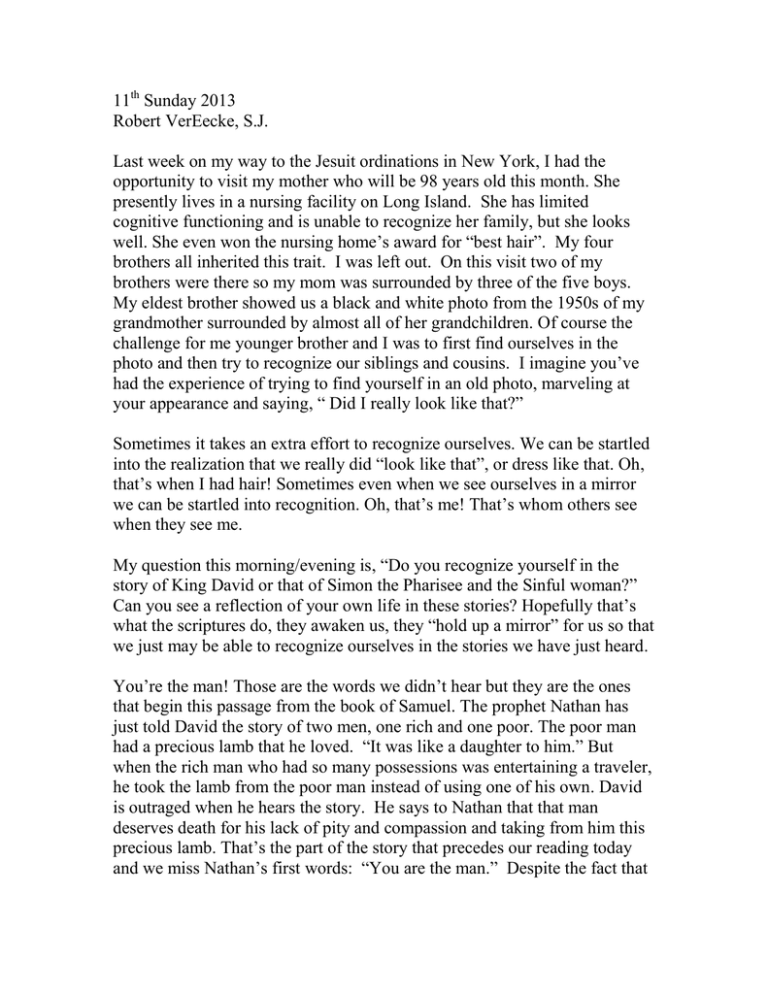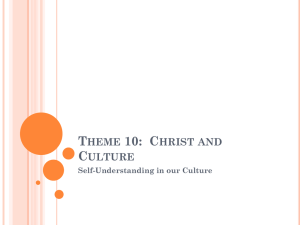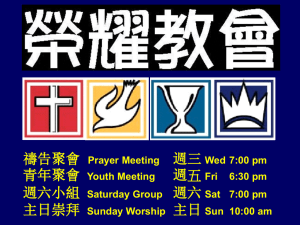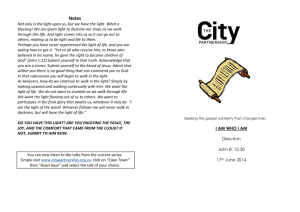11 Sunday 2013 Robert VerEecke, S.J.
advertisement

11th Sunday 2013 Robert VerEecke, S.J. Last week on my way to the Jesuit ordinations in New York, I had the opportunity to visit my mother who will be 98 years old this month. She presently lives in a nursing facility on Long Island. She has limited cognitive functioning and is unable to recognize her family, but she looks well. She even won the nursing home’s award for “best hair”. My four brothers all inherited this trait. I was left out. On this visit two of my brothers were there so my mom was surrounded by three of the five boys. My eldest brother showed us a black and white photo from the 1950s of my grandmother surrounded by almost all of her grandchildren. Of course the challenge for me younger brother and I was to first find ourselves in the photo and then try to recognize our siblings and cousins. I imagine you’ve had the experience of trying to find yourself in an old photo, marveling at your appearance and saying, “ Did I really look like that?” Sometimes it takes an extra effort to recognize ourselves. We can be startled into the realization that we really did “look like that”, or dress like that. Oh, that’s when I had hair! Sometimes even when we see ourselves in a mirror we can be startled into recognition. Oh, that’s me! That’s whom others see when they see me. My question this morning/evening is, “Do you recognize yourself in the story of King David or that of Simon the Pharisee and the Sinful woman?” Can you see a reflection of your own life in these stories? Hopefully that’s what the scriptures do, they awaken us, they “hold up a mirror” for us so that we just may be able to recognize ourselves in the stories we have just heard. You’re the man! Those are the words we didn’t hear but they are the ones that begin this passage from the book of Samuel. The prophet Nathan has just told David the story of two men, one rich and one poor. The poor man had a precious lamb that he loved. “It was like a daughter to him.” But when the rich man who had so many possessions was entertaining a traveler, he took the lamb from the poor man instead of using one of his own. David is outraged when he hears the story. He says to Nathan that that man deserves death for his lack of pity and compassion and taking from him this precious lamb. That’s the part of the story that precedes our reading today and we miss Nathan’s first words: “You are the man.” Despite the fact that God had given you so much, you took for yourself the wife of Uriah and had him killed. Suddenly there is recognition on the part of David. He sees his reflection in the mirror of the man who had acted cruelly and without compassion, taking for himself what was not his. The words of Nathan “you are the man” brought him to his senses. He recognizes himself as a sinner. I’m not suggesting that any of us are sinners on the scale of King David. But can we see ourselves reflected in this story? Can we hear “how much the Lord has done for us and given us”, and yet we continue to be self-centered, and sinful? I know I can. In the Gospel, Jesus holds up the mirror to Simon the Pharisee so that he can see his lack of compassion reflected in the story of the two people who were forgiven their debts. But where in the story of David we see his shame and his self-awareness, we do not see self-recognition on the part of Simon. He continues to judge the woman and Jesus. Can we see ourselves in Simon? Do we resist the truth about our own hardness of heart? When someone speaks the truth to us about ourselves do we hide behind our defenses and excuses? And then there is the woman who was a “known” sinner. To take such a bold and courageous action as to enter this house filled with men and publicly make a show of her love and affection for Jesus, she must have had a moment of self-recognition before this scene takes place. In my imagination, this woman must have gotten a glimpse of Jesus somewhere. Maybe she witnessed one of his healings. I imagine though, that somehow she was able to look into the eyes of Jesus and see her reflection. And what did she see and recognize in the eyes of Jesus? Infinite love. Did she see herself as that “sinful woman”? Perhaps. But more she saw herself as infinitely, unconditionally loved. Something in her was awoken at that moment of seeing herself as Jesus saw her. Something that gave her the courage to express her love and gratitude. Can we see ourselves reflected in the story of the sinful woman? Can we see our reflection in the eyes of Jesus, loving us as we are, even with our faults, our failings and our sinfulness? Can we be awoken to this infinite love and caring that is God’s gift to us in Jesus Christ? Remember: I no longer live but Christ lives in me.









